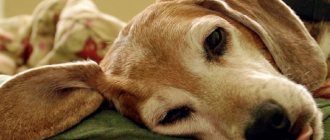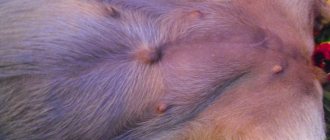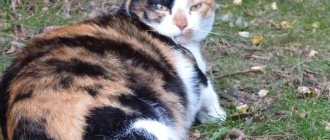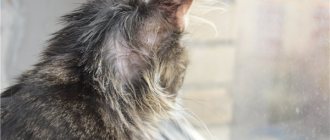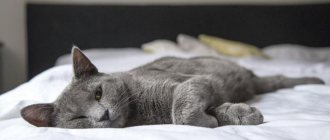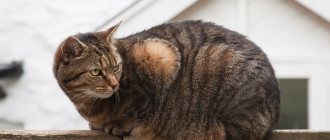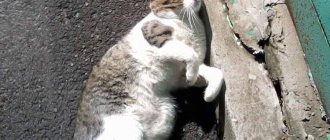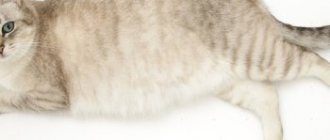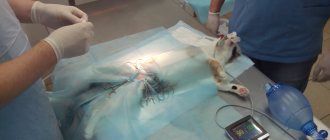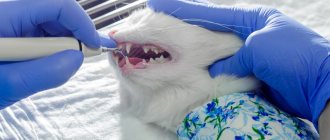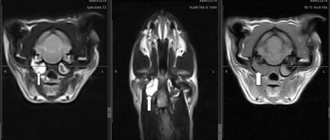Obvious rumbling and seething in the animal’s stomach is a sign of increased gas formation. If these phenomena are repeated many times, the animal shows anxiety, most likely it has an organic or functional digestive disorder.
Severe seething usually accompanies fermentative dyspepsia, which develops in the upper intestines. In case of indigestion in the lower sections (putrefactive dyspepsia), there is usually no seething, but foul-smelling gases are actively released.
Causes of rumbling and seething
Increased gas formation causes serious discomfort in animals. Its reasons can be simple, for example, a change in food or a transition from natural food to artificial food, mixed nutrition.
In young kittens, dyspepsia often develops if the cat eats artificial food and drinks mother's milk. A kitten may have dyspepsia due to congenital lactose intolerance. Such kittens need special nutrition. Otherwise they will die.
Quite often, a cat develops dyspepsia even when fed high-quality food from well-known brands, since these foods contain a lot of preservatives and fiber, and dry food contains a lot of drying agents and flavorings.
Unfortunately, dyspepsia caused by such foods is not the worst option for your pet.
The cause of active seething in the stomach can be very serious illnesses.
The cause of rumbling and seething in the animal’s digestive system can be serious diseases of the organs involved in digestion, bacterial intestinal infections and severe viral diseases of the cat.
Inflammation of the pancreas often leads to enzymatic deficiency and, as a result, fermentative dyspepsia. If the animal's bowel movements are abnormal, vomiting occurs, the animal is bothered by nausea, and refuses to eat - this may be a manifestation of pancreatitis.
If the animal has a bloated abdomen, purulent rhinitis and conjunctivitis, high fever and general weakness, it is bothered by flatulence, accompanied by strong rumbling in the stomach, it may have a viral infection that is severe for a cat (calcivirosis or rhinotracheitis).
Peptic ulcers of the stomach and duodenum, gastritis, colitis, enteritis, intestinal dyskinesia - all these diseases can be accompanied by rumbling, because the process of digesting the bolus of food and moving feces is disrupted. Usually these diseases are accompanied by stool disorder and other symptoms unpleasant for the animal.
Inflammatory processes in the mucous membrane of the gastrointestinal tract, indigestion, and rumbling can be caused by certain medications (anti-inflammatory, hormones, and others).
Aerophagia, caused by stress or other reasons, can lead to rumbling in the animal’s stomach. At the same time, his abdomen is swollen, and upon palpation the abdominal wall is tense.
Diseases of the liver, gall bladder, its ducts (dyskinesia), and oncological processes affecting the digestive organs of an animal can lead to dyspepsia and the resulting seething. In addition to loud sounds in the stomach, the animal also exhibits more dangerous symptoms: diarrhea, vomiting (sometimes with blood), emaciation of the animal, and in severe cases, refusal to eat.
If the animal's stomach growls strongly, diarrhea occurs, and the stools are foamy and foul-smelling, the cat has general weakness, and refuses to eat, then this is a reason to suspect an intestinal infection.
The relationship between thirst and stomach grumbling
But not only by hunger! Sometimes the sounds made by your pet indicate his desire to drink, or that he has already managed to quench his thirst, having greatly succeeded in this . What does it mean? The fact is that with severe thirst, the intestines will make all the same sounds as if the cat was hungry. The lumen of the gastrointestinal tract in such cases is absolutely free, and therefore nothing interferes with the gases.
But when your pet gets well drunk, water will flow through its half-empty intestines, pushing forward all the same gas bubbles. The sounds of rumbling are interspersed with melodic murmurs. There is no need to worry: if your pet pretends to be a river stream, this phenomenon does not threaten its life and health.
But it's still worth giving a couple of warnings. Firstly, if your cat is very hungry and eats well after that, there is no need to disturb or disturb him in any way during this period. Yes, volvulus in cats is extremely rare, but you still shouldn’t rule out its possibility. However, cats, although they are quite playful creatures, are still “more prudent” than dogs, and therefore after eating they themselves will not jump around, like squirrels. The same applies to quenching thirst. If your pet lapped up a bowl of water after a walk down the street, there is no need to sprint it. This won't end well.
Sharp peristaltic contractions of the intestines and, accordingly, loud and “ominous” sounds can be caused by the same water. Only cold. This is due to the fact that cold liquid has an irritating effect on the mucous membranes of the intestines, causing the latter to begin to contract intensively. Because of this, air bubbles move faster through the lumen of the gastrointestinal tract, and therefore sharp and clearly distinguishable sounds occur. In addition to “special effects,” this phenomenon is fraught with the same diarrhea and abdominal pain, since the gas greatly distends the walls of the intestines. In severe cases, cats fall, roll on the floor, meow hoarsely and loudly, or wheeze.
Treatment
If the only manifestation of dyspepsia is loud rumbling along the animal’s intestines, then it should be:
- protect from stress;
- feed in small portions, but more often, in a specially designated place where no one will disturb the animal;
- you need to choose the right food, you can consult a specialist;
- if an animal eats artificial food, it is advisable not to spoil it with treats from your table, “human” food often provokes dyspepsia;
- trash cans should be kept out of the animal's reach.
If this strategy is not successful or additional alarming symptoms appear, you should definitely take your cat to the veterinarian.
Why is he purring?
If you have ever experienced the feeling of “sucking” hunger at least once in your life, then you are probably familiar with the rumbling of your stomach firsthand. In such cases, this phenomenon indicates an empty digestive tract. This is how the body “hints” to its owner the need for a good meal. So it is in the case of a cat. If his stomach growls loudly, then your pet most likely simply wants to eat. As soon as you feed it, the animal will return to its favorite pastime - it will lick itself tastefully, and then sleep sweetly.
But! Sometimes a “hurricane” in your pet’s stomach indicates the exact opposite situation, that is, overeating. In the modern world, it is not uncommon for a cat owner to spend almost the entire day at work, returning only late in the evening. And it’s good if there are household members who can feed a hungry sufferer. Otherwise, the cat, having received its portion of food, greedily pounces on it, and then begins to beg for more. No wonder he overeats a lot. Grumbling and other strange stomach sounds in such situations are only a consequence of the inability of the digestive system to cope with the “happiness” that has fallen on it.
And the “roars” of the stomach are a trifle. If a cat has eaten so much that its gastrointestinal tract cannot digest it all properly, the food masses simply begin to rot and deteriorate. All this can lead to either severe food poisoning or serious indigestion. “Thunders and lightning” in the stomach of an overeating cat is a sure sign of impending diarrhea.
Aerophagia as a cause of grumbling
Another phenomenon is closely related to excessive gluttony. It's called aerophagia . Translated, this literally means “eating air.” If a cat eats greedily, he simultaneously swallows a lot of air (sometimes so much that bloating develops). Part of it comes out through belching, and the rest goes deep into the intestines, where it produces rumbling and roaring sounds. Subsequently, the air comes out quite naturally, which is why aerophagia is often confused with flatulence. But, unlike gases in the intestines, it does not pose any particular danger. So what to do? Just try to feed your glutton more often, but in smaller portions. Then the cat will not swallow such volumes of air, and the problem will solve itself.
How are grumbling and worms related?
In the most direct way, no matter how strange it may seem. Perhaps you have seen mangy and disheveled kittens with oversized, swollen bellies? If so, then you are “lucky” to observe the main visual sign of toxocariasis: a swollen and pear-shaped abdomen with severe general exhaustion of the pet. You can easily verify this by stroking the animal in the chest area. You can easily feel the ribs protruding from under the skin. A sick kitten often has diarrhea, and the excreted feces have a greenish-yellowish color and an unbearably disgusting smell.
So here it is. Such signs indicate a very serious, generalized helminthic infestation. At the same time, there may be many dozens and even hundreds of parasites in the intestines of an unfortunate kitten! They eat the food taken by the animal almost faster than the animal itself. As a result, the kitten's intestines remain empty, with the exception of a huge volume of gases formed due to putrefactive and other processes. To a large extent, this is facilitated by the worms themselves, which secrete a lot of toxins and other unpleasant compounds.
It is the gases moving through the half-empty gastrointestinal tract and the intertwining of helminths that are the source of those strange sounds and rumblings. As you yourself understand, rumbling is only a small part of all the problems of an unfortunate pet. And if he is not cured of the parasitic disease, he may die from severe intoxication. In addition, the balls of parasites can be so large that the intestines eventually cannot withstand their pressure and burst. As a result, death from massive internal bleeding from a ruptured intestine.
One of the signs indicating a possible helminthic disease is the alternation of constant diarrhea and constipation, and the excreted feces have a mucous consistency, a greenish-yellow color with possible red impurities of blood and a completely unbearable smell. What other reasons may be responsible for the occurrence of bowel sounds?
How are grumbling and worms related?
In the most direct way, no matter how strange it may seem. Perhaps you have seen mangy and disheveled kittens with oversized, swollen bellies? If so, then you are “lucky” to observe the main visual sign of toxocariasis: a swollen and pear-shaped abdomen with severe general exhaustion of the pet. You can easily verify this by stroking the animal in the chest area. You can easily feel the ribs protruding from under the skin. A sick kitten often has diarrhea, and the excreted feces have a greenish-yellowish color and an unbearably disgusting smell.
So here it is. Such signs indicate a very serious, generalized helminthic infestation. At the same time, there may be many dozens and even hundreds of parasites in the intestines of an unfortunate kitten! They eat the food taken by the animal almost faster than the animal itself. As a result, the kitten's intestines remain empty, with the exception of a huge volume of gases formed due to putrefactive and other processes. To a large extent, this is facilitated by the worms themselves, which secrete a lot of toxins and other unpleasant compounds.
It is the gases moving through the half-empty gastrointestinal tract and the intertwining of helminths that are the source of those strange sounds and rumblings. As you yourself understand, rumbling is only a small part of all the problems of an unfortunate pet. And if he is not cured of the parasitic disease, he may die from severe intoxication. In addition, the balls of parasites can be so large that the intestines eventually cannot withstand their pressure and burst. As a result, death from massive internal bleeding from a ruptured intestine.
One of the signs indicating a possible helminthic disease is the alternation of constant diarrhea and constipation, and the excreted feces have a mucous consistency, a greenish-yellow color with possible red impurities of blood and a completely unbearable smell. What other reasons may be responsible for the occurrence of bowel sounds?
Causes of a rumbling stomach in a cat
The main causes of rumbling in the stomach in mustachioed striped animals:
- First of all, it is hunger. An empty intestine makes sounds when all the food has already been digested. It’s very easy to rid your pet of rumbling – it’s time to feed. Immediately after a hearty snack, the rumbling will stop.
- Disturbed feeding regime. In cases where the owner, before leaving for work, forgets to leave the pet a sufficient amount of food, the cat manages to become too hungry. As a result, he overeats in the evening. A sudden load causes the gastrointestinal tract to become more active. The rapid process of digesting food, absorbing nutrients and moving unnecessary ballast through the intestines begins. Rumbling in this case is absolutely normal.
Other causes of rumbling:
- excessive swallowing of air with food;
- overeating on a regular basis;
- lack of fluid in the body;
- increased formation of gases;
- helminthic infestations.
The eaten food begins to rot. This process is accompanied by increased formation of gases. All this can ultimately result in poisoning or indigestion.
What to do?
If gurgling in the abdomen is not provoked by pathologies, specific therapy for this condition is not required. It is enough for owners to protect the cat from stress. Then you need to change the diet, excluding from it the food that he prepares for himself. It is recommended to feed your cat natural food, but you can diversify the menu with industrial supplements. It is better to entrust the choice in favor of one of them to your veterinarian. Feeding the cat should be done indoors, where no one will disturb her. It is recommended to make smaller portions, but feed the animal more often. In order not to provoke food poisoning from spoiled food, the trash can must be installed in a place inaccessible to the cat.
Does your furry pet (or pet) have a churning stomach? At the same time, the cat clearly feels uncomfortable, strives for privacy, and its behavior clearly indicates an unhealthy state of health? Seething in the stomach can be a symptom of many diseases in cats: from a banal disorder due to poor quality nutrition to a serious helminthic infestation. Or, even simpler: the cat may just be hungry! And his stomach may be bubbling from hunger - just like in people. This is especially noticeable if the animal is fed strictly according to the clock. Before the next meal, there is a high probability that the cat will have a bubbling stomach.
Pagophagia (ice eating)
The main feature of pagophagia is the desire to eat ice. You can drink drinks with ice and eat ice cubes while emptying your freezer. This disorder should not be taken lightly, as symptoms may worsen over time. In a study conducted at the University College of Health Sciences and Hospital. Guru Tegh Bahadur (New Delhi, India) described an interesting clinical case. A 42-year-old woman with pagophagia consumed only a few ice cubes per day, but then increased to 20–30 ice cubes.
Why does it happen?
In some cases, pagophagia may be a cause or consequence of iron and calcium deficiency. Deficiencies in these micronutrients can lead to additional symptoms, including:
- pale skin;
- increased fatigue;
- brittle nails;
- dizziness;
- cold extremities;
- difficulty concentrating;
- convulsions;
- swelling of the tongue.
A 2014 study by Japanese researchers found that 13 out of 81 participants with iron deficiency anemia were diagnosed with pagophagia. This finding supports the hypothesis of a link between micronutrient deficiency and eating disorders. Additionally, patients can eat ice to reduce one of the symptoms of iron deficiency anemia: a swollen tongue.
Other risk factors for developing pagophagia:
- anxiety disorder;
- depression;
- family inheritance of eating disorders;
- pregnancy.
Why do cats have a problem?
Flatulence
Most often, a kitten's tummy is seething precisely due to bloating and increased gas formation in the intestines. This problem is common not only to people, but also to pets. In addition to the unpleasant aroma that comes from the animal, the owner may notice the cat's anxiety. If you touch her belly, she may begin to react inappropriately. This behavior is caused by pain.
In addition, sometimes gas formation is so severe that the pet has difficulty breathing, drooling, and other symptoms appear that indicate insufficient blood supply to the lungs. Flatulence in a kitten is often caused by gluttony. If a cat eats too much food, it simply does not have time to be digested. As a result, putrefactive processes are observed, which become the cause of rumbling, release of gases and toxins. If timely assistance is not provided, the cat may experience severe intoxication of the body, which can even lead to death.
The following factors can provoke flatulence in pets:
If a cat eats fermented milk products excessively, they can provoke such a symptom.
- eating stale food;
- allergic reactions to products;
- balls of hair in the intestines;
- helminthic infestation;
- abuse of fermented milk products.
Return to contents
Aerophagia
Gluttony also causes this phenomenon, which is an increased swallowing of air during food consumption. When a pet eats food too greedily, at the same time it swallows air. A small amount of it comes out during belching, while the rest penetrates the intestines, causing the kitten’s tummy to rumble. Then the air comes out naturally, which is why aerophagia is often confused with flatulence. However, unlike it, swallowing air does not pose a danger to the health and life of the cat. To cope with the problem, the first thing the owner needs to do is start feeding the cat more often, making the portions smaller.
Worm infestation
If your cat is vomiting and has a rumbling stomach, worms are often the cause. In addition to these symptoms, you can notice a serious increase in the size of the abdomen against the background of general thinness and exhaustion of the pet. Pets experience constant diarrhea, the feces take on a green tint and smell unpleasant. The body can contain hundreds of parasites that produce toxins during their life. If antihelminthic therapy is not carried out, the cat may die due to serious poisoning.
Intestinal helminthic infestation provokes the development of the following symptoms:
- yellowing of mucous membranes;
- increase in liver size;
- itching of the perianal area;
- hair loss;
- discharge of pus from the nose and eyes;
- blood impurities in stool.
